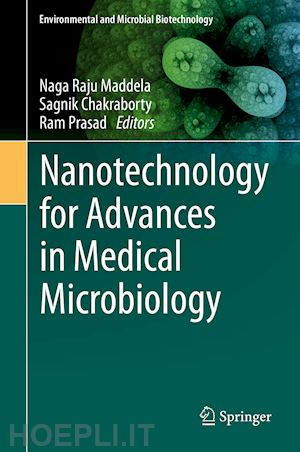
Questo prodotto usufruisce delle SPEDIZIONI GRATIS
selezionando l'opzione Corriere Veloce in fase di ordine.
Pagabile anche con Carta della cultura giovani e del merito, 18App Bonus Cultura e Carta del Docente
Combined fields of Microbiology and Nanotechnology have been most successful in providing novel solutions for protecting the health of humans and environment. This book covers the implications of nano-strategies to combat bacterial pathogens, applications of nanotechniques in microbiology, and innovative advances in the area of medical microbiology. Contents are divided into three sections -- Nanoscience in controlling bacterial pathogens, Nanoscience in Microbiology, Medical Microbiology. This volume is going to provide timely information about the technological advances of Nanoscience in the domain of Microbiology, with a special emphasis on Pathobiology. The book is a useful read for students and researchers in microbiology, nanotechnology and medical microbiology.
Naga Raju Maddela received his M.Sc. (1996–1998) and Ph.D. (2012) in Microbiology from Sri Krishnadevaraya University, Anantapuramu, India. During his doctoral program in the area of Environmental Microbiology, he investigated the effects of industrial effluents/insecticides on soil microorganisms and their biological activities and worked as a Faculty in Microbiology for 17 years, teaching undergraduate and postgraduate students. He received “Prometeo Investigator Fellowship” (2013–2015) from Secretaría de Educación Superior, Ciencia, Tecnología e Innovación (SENESCYT), Ecuador, and “Postdoctoral Fellowship” (2016–2018) from Sun Yat-sen University, China. He also received external funding from “China Postdoctoral Science Foundation” in 2017, internal funding from “Universidad Técnica de Manabí” in 2020, worked in the area of Environmental Biotechnology, participated in 19 national / international conferences, and presented research data in China, Cuba, Ecuador, India and Singapore. Currently, he is working as a full-time Professor at the Facultad de Ciencias de la Salud, Universidad Técnica de Manabí, Portoviejo, Ecuador. He has published 4 Books (Springer), 2 Chapters (InTech Open / Springer) and 42 research papers.
Sagnik Chakraborty Completed M.Sc. in Biotechnology (2006-2008) from Bangalore University and Ph.D. from National Institute of Technology Durgapur in 2014 Department of Biotechnology, India. His research work focused on the removal of the dyes by biomass-derived from waste materials and removal of the dyes from an industrial outlet of the textile plants- biomass derived from the various waste. Until now, he published forty papers according to the research findings. He has received several awards during his research career. He has mentored undergraduate and postgraduate students for their projects. Furthermore, Sagnik completed his Post-Doctoral Research 2015-2018 from Hebei University of Technology, Tianjin, PR China, the fund approved by the Ministry of Education PR China. He has received several intramural projects funds in his research domain. Moreover, he received an International Young Scientist Award from the National Natural Science Foundation of China in 2019 with grant aid for further research. Sagnik received the Brand Ambassador Award in 2019 from The Bentham Science Publisher and won several outstanding reviewing awards from Elsevier. Lately, he is engaged as Senior Researcher at Jiangsu University in the School of Environmental Science and Safety Engineering.
Ram Prasad, Ph.D. is associated with Department of Botany, Mahatma Gandhi Central University, Motihari, Bihar, India. His research interest includes applied & environmental microbiology, plant-microbe-interactions, sustainable agriculture and nanobiotechnology. Dr. Prasad has more than one hundred seventy-five publications to his credit, including research papers, review articles & book chapters and five patents issued or pending, and edited or authored several books. Dr. Prasad has twelve years of teaching experience and has been awarded the Young Scientist Award & Prof. J.S. Datta Munshi Gold Medal by the International Society for Ecological Communications; FSAB fellowship by the Society for Applied Biotechnology; the American Cancer Society UICC International Fellowship for Beginning Investigators, USA; Outstanding Scientist Award in the field of Microbiology; BRICPL Science Investigator Award and Research Excellence Award etc. He has been serving as editorial board members: Frontiers in Microbiology, Frontiers in Nutrition, Archives of Phytopathology and Plant Protection, Phyton- International Journal of Experimental Botany; Academia Journal of Biotechnology, Journal of Renewable Materials, Biocell including Series editor of Nanotechnology in the Life Sciences, Springer Nature, USA. Previously, Dr. Prasad served as Assistant Professor Amity University Uttar Pradesh, India; Visiting Assistant Professor, Whiting School of Engineering, Department of Mechanical Engineering at Johns Hopkins University, Baltimore, United States and Research Associate Professor at School of Environmental Science and Engineering, Sun Yat-sen University, Guangzhou, China.











Il sito utilizza cookie ed altri strumenti di tracciamento che raccolgono informazioni dal dispositivo dell’utente. Oltre ai cookie tecnici ed analitici aggregati, strettamente necessari per il funzionamento di questo sito web, previo consenso dell’utente possono essere installati cookie di profilazione e marketing e cookie dei social media. Cliccando su “Accetto tutti i cookie” saranno attivate tutte le categorie di cookie. Per accettare solo deterninate categorie di cookie, cliccare invece su “Impostazioni cookie”. Chiudendo il banner o continuando a navigare saranno installati solo cookie tecnici. Per maggiori dettagli, consultare la Cookie Policy.